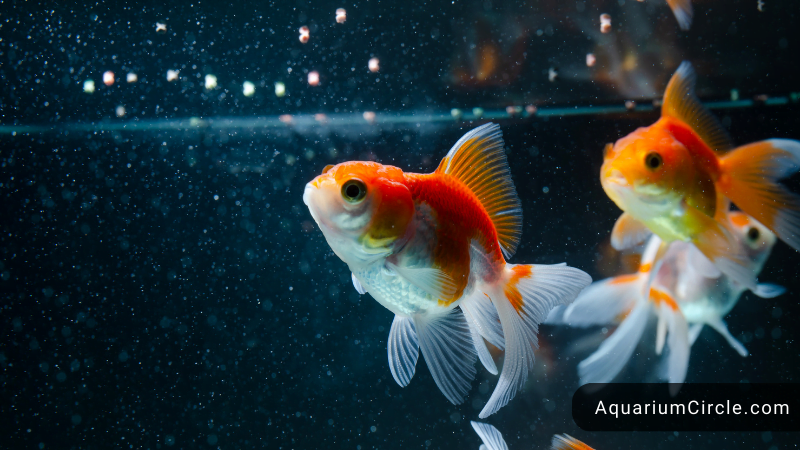In this post, we’ll discuss a problem that many fish owners have encountered at some point. Suppose it’s the holiday season, and you’re ready to go on vacation, but you can’t bring your pet along. Or sometimes you can’t be at home to feed them due to your work, and you have to skip feeding your goldfish. Whatever the scenario, you might wonder, “How long can goldfish go without food?”
Actually, the real consideration is the distinction between how often goldfish need to eat and how often they should be eating.
Goldfish may live without food for up to 14 days. They scavenge their tank and graze on algae during this period. Goldfish may exist indefinitely without eating in ponds, depending on the quantity and availability of algae (occasionally goldfish also eat plants) and insects.
If you’ve ever wondered how much fish food to give your goldfish or how long they can survive without food, keep reading for answers to these and other fish-keeping queries, as well as some general feeding habits and goldfish care advice.
See also:
- Can Overfeeding Goldfish Kill Them? 5 Tips To Avoid Overfeeding
- Are Goldfish Edible? – 3 Reasons They’re Never A Great Meal
How Long Can Goldfish Go Without Food In Your Tank Or Pond?
Let’s dive into the main part of this post! In this part, we will answer “how long a goldfish can go without food?” And we will provide some factors that have effects on the length that goldfish can survive without food as well.
In ideal situations, if the water quality is appropriate, goldfish may survive up to two weeks without food. However, depending on a few things such as your feeding habits, the sort of fish feed you generally use, and the water conditions, the rate might vary and can be as little as a few days. It is not advisable to keep your pet unfed for extended periods of time.
While you do not have to feed your fish every day, it is preferable if you can construct a continuous, regular feeding cycle.
How much and what kind of food you feed them depends on what you like to provide them as well as what’s available at your local pet store.
Factors that affect how long goldfish can live without food
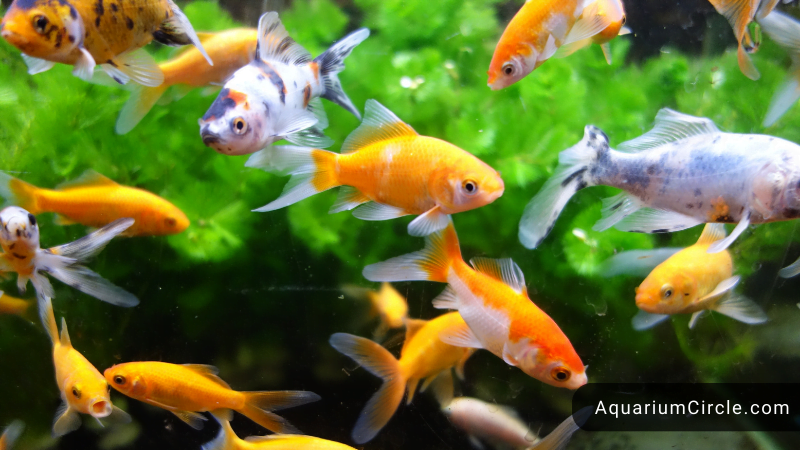
Temperature Considerations
Remember that almost all pet fish are ectothermic, which means that their body temperature is nearly identical to their water temperature. When the water temperature rises, their metabolism speeds up, their immune system improves, and they prepare to give birth to more baby fish. Goldfish, not tropical fish, do well in a wide temperature range from 60 to 80 °F (15 to 27 °C). Their metabolism will be substantially slower at the cooler end of this spectrum than at the warmer end. Depending on the emergency circumstances you currently encounter, your tank temperature may be higher or lower. If you can, attempt to bring down your water temperature very gently. This will decrease your fish’s metabolism and energy requirements.
Here are some techniques that may assist you in lowering your water temperature:
- Bring your tank to a lower place in your home, preferably the basement. Don’t forget the light!
- Add ice to your tank in small amounts. Remember to add water conditioner. You can use water bottles that have been frozen as well.
- Add shade structures such as umbrellas, plants, or tarps to outdoor ponds at least 1′ off the surface and provide side ventilation.
- If you can place your aeration in the flow of an air conditioner, have it draw cooler air.
What is your goldfish eating?
The nutrition of your goldfish has a direct influence on the chemistry of your water. If you can’t feed your fish, I doubt you can keep up with your regular maintenance. Select a diet with reduced protein to reduce ammonia production from your fish. Unless they are show fish, most goldfish should consume approximately 30% protein, regardless of their circumstances. Again, the lower the metabolic demands of your fish, the less food or fewer feedings they will require.
Goldfish Body Condition
Unlike cats and dogs, fish’s bodily condition can be difficult to measure. Body condition is a visual evaluation of a fish’s fitness, obesity, and emaciation. Given the range of goldfish body forms, it is quite challenging to compare distinct breeds. However, fish in stronger physical condition, with appropriate muscle and fat accumulation, will be able to endure brief periods of non-feeding better than starving fish.
So, how many days can goldfish live without being fed?
The answer to this issue depends on your tank or pond temperature, how well you can manage it, and your fish’s weight and body condition prior to halting food.
Below is the guideline table to show you the relevance between the water temperature and the days without food goldfish can live. These are simply general recommendations! They are not specified fasting intervals. Only withhold feeding in an emergency circumstance or under an aquatic veterinarian’s direct instructions.
| WATER Temperature | Days without Food |
|---|---|
| 32F to 55F (0C to 12C) | Weeks to Months |
| 55F to 60F (12C to 15C) | 6 to 8 days |
| 60F to 65F (15C to 18C) | 5 to 6 days |
| 65F to 70F (18C to 21C) | 4 to 5 days |
| 70F to 75F (21C to 24C) | 3 to 4 days |
| 75F to 85F (24 to 29C) | 1 to 3 days |
How To Take Care Of Your Goldfish When You’re On Vacation?
I understand that you don’t want to miss out on that holiday because you need to feed your goldfish.
The good news is that you will not have to. There’s nothing to worry about as long as you’ve been feeding your goldfish properly, the aquarium water is clean, and you have excellent filtration. If you’re going away for up to two weeks, your goldfish should be alright, although there is some danger involved. Here are some of your alternatives. Which one is suitable is largely up to you.
Pet-sitters
If you have a trustworthy friend or neighbor, they may be a terrific resource for keeping your goldfish fed! Make sure you go through your complete strategy with the fish keepers and that they have the phone number for your favorite certified veterinarian.
It’s a good idea to let them know to get genuine veterinarian care in case of an emergency, since this can be the key to helping your goldfish survive a sudden sickness. If you know you’ll be gone most of the week, hiring someone to be the weekend feeders might be a wonderful method to ensure regular feeding in your aquarium.
Using an automatic fish feeder
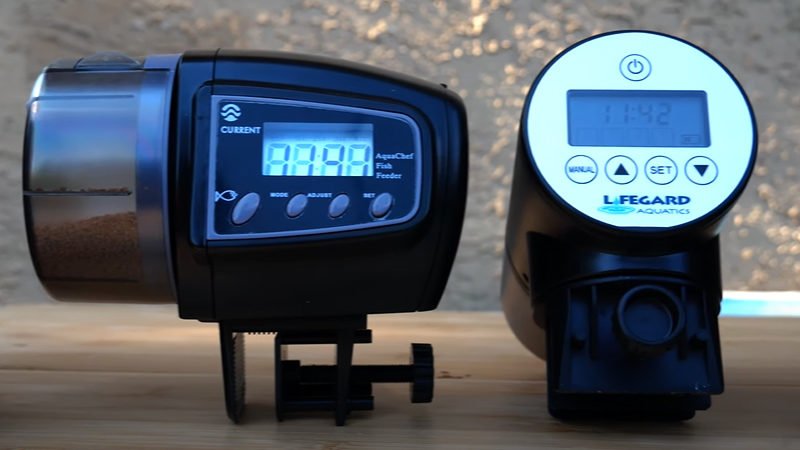
Automatic feeders are an excellent alternative for keeping not only goldfish but any aquarium fish fed!
These automated feeders contain an integrated timer that feeds pellets on a regular basis, ensuring that your aquarium’s fish have something to eat while you’re away.
If your goldfish likes smaller meals, one disadvantage of these devices is that they do not track how much food has been consumed. Water contamination increases as the meal stays uneaten, eventually leading to ammonia poisoning problems in the long term.
Slow release fish food
These products are created to gradually release food from within the aquarium over time, sometimes up to two weeks! They appear in the form of feeding blocks that disintegrate gradually over time.
Slow-release fish food is a terrific approach to keep your fish fed that takes even less input than a mechanical feed system and is frequently considerably cheaper to purchase from most retailers.
An extra benefit is that because the food is released at a set rate, it will not contribute to water pollution as long as your goldfish feed on a regular basis. But you still need test out feeding blocks days before your vacation.
How Do I Know If My Goldfish Is Hungry?
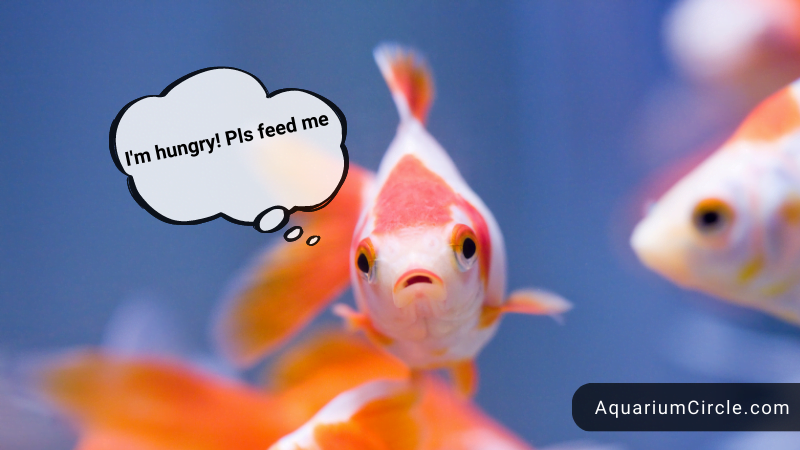
If you have developed a feeding schedule, your goldfish will be really hungry if you forget to provide food on time. It’s common for goldfish in the wild to skip a meal because they don’t eat every day and only eat when they catch food.
On the other hand, your captive goldfish will become familiar with its eating schedule, and missing a meal would make your pet hungry and possibly furious.
Even though you know how long your goldfish can go without eating, it may still show indications of hunger from time to time. It will express hunger in several ways. Below are some of them that you can check to know when your goldfish are craving for food:
- Looking for food: If your goldfish swims in parts of the tank where it normally does not swim, it is seeking for food. Pay attention to whether it is excavating the substrate since this indicates that it is hungry and searching for food.
- Suddenly scavenging: Fish that don’t regularly scavenge but suddenly start scavenging or investigating the top of the tank may make you question what’s going on. These symptoms indicate that your fish is hungry and looking for food.
- Aggressive when getting food: If your goldfish becomes aggressive or eats rapidly, this is another indication that it is hungry. Even though they normally are quick eaters, if you notice that it consumes faster than normal, it is generally because it has been hungry for some time.
- Lazy or lethargic fish: If you notice your goldfish is slow or acting lethargic, it might be because it hasn’t had enough food for a while and needs to eat.
- Hostile behaviors: Some fish may attack and harass their tankmates (such as beta fish) when they go hungry, but this doesn’t always imply they’re hungry; their hostility might be due to a variety of factors.
What Should You Feed Your Fish?
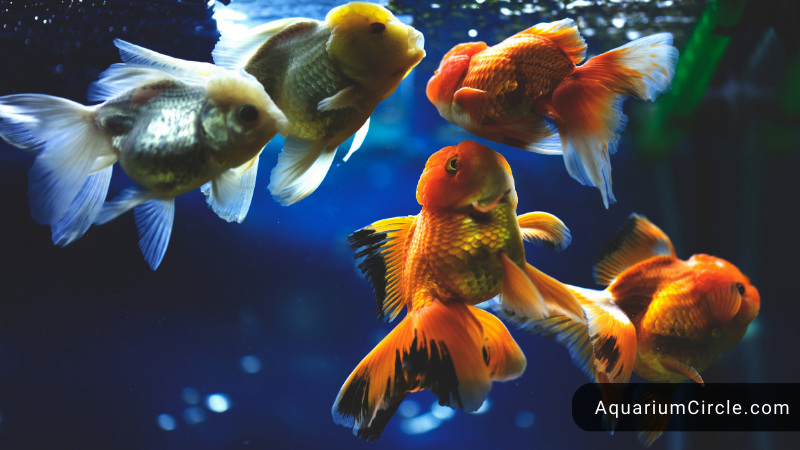
It’s highly recommended that you should feed your goldfish live, frozen, or freeze-dried items such as bloodworms, crickets, mealworms, brine shrimp, ghost shrimp, daphnia, and so on.
It is critical to provide your fish with sufficient, right amount of food so that they may grow and flourish. Even though goldfish are opportunistic feeders (they will eat as long as there is food), their eating frenzy may be controlled. If you don’t, your fish might suffer from intestinal problems caused by overfeeding.
Keep in mind that the more your fish eat, the more waste they create, and huge volumes of waste produce pollutants that might overflow your tank. Eventually , these pollutants can cause a variety of diseases and possibly kill your fish. As a result, it is critical to understand how fish eat and which foods are beneficial to your fish in order for them to have a healthy life in your house.
Goldfish diet in the wild
In the wild, goldfish eat a variety of aquatic insects and plants, tiny crustaceans, and algae. Because wild goldfish must adapt to an ever-changing habitat, battle water currents, and avoid predators, they seek for food in order to maintain their extremely active life.
Basic feeding information
Goldfish in the wild are much more active than goldfish in an aquarium. Because fish in your tank are less busy, they require less food to keep healthy. You can easily find specifically prepared goldfish food, and it is advised that you give it to your pet because it has a much lower protein concentration.
Large levels of protein are difficult for goldfish to absorb. As a result, though their diet contains protein, it must be in tiny amounts. Furthermore, the goldfish diet need a higher concentration of carbohydrates, and there are various outstanding solutions on the market.
Goldfish food comes in a variety of formats, including special pellets and flakes. Both these varieties contain everything your pet needs. Keep in mind that pellets sink to the bottom of your aquarium, whereas flakes float to the top. Because it can feed at different tank levels, you may select the food kind based on your pet’s feeding preferences.
Other fish foods
Aside from pellets and flakes, goldfish like eating ghost shrimp, daphnia, brine shrimp, crickets, bloodworms, mealworms, and other insects. You can get any of these products in live, freeze-dried, or frozen form.
Which human foods your goldfish can eat?
You can feed your goldfish another type of food besides just fish food. If you prepare them appropriately, you may treat your fish with a range of human foods. The foods we’ll discuss below should not replace their current diet, but good to be used as supplements.
Before we go into all of the human foods you may feed your goldfish, it’s important to note that you should always give your fish little amounts so that your pet can consume it in one or two minutes. You should also clean your home aquarium when it has finished eating.
You should also prepare all of these foods according to the instructions before delivering them to your fish:
- Shelled peas – remove the skin and feed little pieces to your fish.
- Leafy greens – your goldfish can eat spinach, lettuce, chard, kale, and other similar vegetables, but cut them into little pieces beforehand.
- Cooked rice – You may feed your fish cooked rice, but only in modest amounts to avoid overfeeding your pet.
- Broccoli and corn – make sure to boil (or microwave) it, and then dice it before serving.
- Carrots and zucchini – they must be peeled, boiled (or microwaved), and diced before serving with your fish.
- Cucumber slices – Cut a cucumber into slices and then boil or microwave them before offering to your pet.
- Grapes – this fruit is great for goldfish, but you must first peel and cut it before serving.
- Orange and watermelon slices – like grapes, are excellent additions to your goldfish’s diet. Before serving your fish, remember to cut them into little slices.
How Often & How Much Should You Feed Your Goldfish?
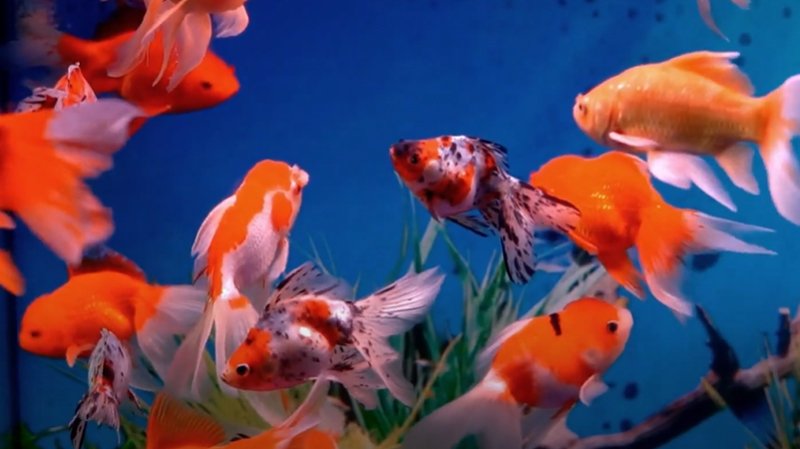
You should feed your goldfish at least twice a day, and you should never feed your fish once a day with a large amount of food, this is called you are overfeeding your fish. There are two reasons why not, the first one has to do with the fact that goldfish tend to continue eating until they feel unwell. The other reason is more important, they are never able to finish all in one sitting! The majority of the food will fall down and completely pollute your aquarium. By doing this, you’re essentially poisoning your own goldfish, which I’m sure is not your intention!
Factors that affect how frequently should you feed your goldfish?
In most cases, you should feed your adult fish once a day, however there are few instances that require you to change its meal frequency:
- The goldfish’s age – the feeding frequency must be adjusted based on the maturity of your fish. If your fish is young (less than a year old), you should feed it twice or even three times every day to ensure that your fish can grow healthily.
- Water temperature – When the water temperature is between 65° and 85° F, your fish’s metabolism is at its peak, and you should feed it two to four times each day. If the temperature is between 50° and 60° F, feed your fish once every 24 to 48 hours since its metabolism is slower and it will not digest food adequately. If the water temperature in your tank falls below 50° F or rises beyond 90° F, you should stop feeding your fish.
- Feeding during breeding season – Feed your goldfish as much as it can eat in 15-30 minutes, 3-4 times a day, but remember to clean the water in your tank. Female goldfish create healthy eggs when they are fed adequate protein.
- Multiple fish – If you have more than one goldfish in your tank or pond, follow a feeding schedule of 2-3 times per day, and don’t feed them more food than they can absorb in two minutes.
How to avoid underfeeding your fish?
If you find yourself continuously reminding yourself that you need to feed your goldfish, you may need to put up an extra method to keep your fish from being too hungry. You can utilize an automatic fish feeder, as previously stated, or just set a reminder for yourself. With all of the calendar and alarm options at our disposal, don’t forget to include your fish in this list of duties or a routine.
Making fish feeding a regular habit can make life lot simpler for both you and your fish. Having to try and recall the last time the fist ate is just healthy, and it isn’t sustainable for you or the fish. It is quite okay to place a little chart next to the tank that you can check every time you feed the fish. Make sure your children are following through on their responsibilities if they are in charge of feeding the fish. Taking care of a fish is a fantastic method for children to learn, but you must ensure that the fish is properly fed.
See also: Can Overfeeding Goldfish Kill Them? 5 Tips To Avoid Overfeeding
When should you skip feeding your goldfish?
There are numerous common reasons why people cannot feed their fish, such as work travels, out-of-town family visits, vacations, and so on. However, there are also additional factors to consider when deciding whether or not to feed your fish.
Assume your tank has poor water quality or any other water quality problem. In that scenario, it is advised that you stop feeding your fish for a few days until the amount of waste in the tank decreases. Since you already know for how long your goldfish can go without a feed, you may do this without any anxiety whatsoever.
Of course, this will not address the problem. As a result, you must investigate what is causing the water quality in your tank to deteriorate and remedy it as soon as possible. You may either experiment with smaller meals or upgrade your tank’s filtering system. This should help you swiftly clean up the water in your aquarium and keep your fish healthy.
Another common reason you should temporarily stop feeding your fish is if it has swim bladder disease.
Swim bladder disease develops when their digestive tract becomes clogged. If this is the case, you should refrain from feeding your goldfish for a maximum of three days to assist clear the blockage.
Videos About How Long Can Goldfish Go Without Food
How long can fish go without food?
How much to feed goldfish?
Choose your ideal feeder
FAQs
Can goldfish go without food?
Goldfish, like all other fish and forms of life on Earth, cannot survive without food permanently. They will need food at some time in order to survive.
How do I know If I’m feeding my goldfish enough food?
You will know whether you are feeding your goldfish enough if it doesn’t swim upside down. When a goldfish swims that manner around the tank, it is suffering from swim bladder problems caused by a lack of food.
Why do you skip feeding your goldfish?
There are numerous common reasons why people cannot feed their fish, such as work travels, out-of-town family visits, vacations, tank diseases and so on.
Can adult goldfish go a week without food?
Yes, adult goldfish go without food for a week, but it’s not recommended. Leaving your goldfish without food for 3-4 days won’t harm your fish, but try avoiding it if possible.
Can goldfish go without food for three weeks?
No, goldfish can’t go without food for three weeks. Goldfish are able to go up to two weeks without food, but it’s not recommended to leave your fish without food for so long because captive goldfish has its daily feeding schedule. If you are away for longer than three or four days, make arrangements so your goldfish gets its food on a schedule.
Reference

Annette M. Chaney is an experienced marine biologist with over 20 years of experience as an aquarist and fishkeeper. She started her first aquarium at a young age, filling it with frogs and goldfish obtained from the ten-cent pet store.
Annette grew up caring for and breeding African Cichlids, which led to a hobby in high school that doubled as a profitable means. Attending Reed College gave her time to solidify herself as an accomplished aquarium caretaker with an eye for sales. After that, from 2009 – 2013, she studied at Roger Williams University – one of the most prestigious universities for Aquaculture and Aquarium in USA. She is the founder of AquariumCircle since 2010.
